Do we really need more tax breaks and demand for property?
May 2022 Australian property market affordability update
Australian property market prices have started to drift lower. In recent months, mortgage fixed interest rates have risen substantially, now standard variable rates are on the rise. The official rate rose, and already affordability is as poor as it has ever been in some markets.
Housing valuation and affordability statistics worsened over April. For investors, rental yields have never been lower in an absolute sense. Relative to mortgage rates yields are still cheap, but off the record lows of a few months ago.
Markets are pricing in an extraordinary 3%+ increase in interest rates over the next few years. That would double the 2021 mortgage repayments for a 20% deposit mortgage. Given Australia has (a) the second most indebted consumers in the world and (b) mostly variable interest rates, it seems unlikely that interest rates can rise another 3% without crashing the property market before that.
The Federal Government and Reserve Bank have successfully distorted conditions to encourage as many people as possible to borrow as much as possible. An investment in housing is basically a vote of confidence in their ability to keep force-feeding the market.
We run an Australian property market calculator to help investors or potential homeowners determine the returns on Australian property. The idea we want to illustrate is that there are a number of key inputs into housing valuation. Interest rates are the most important, but the other limiting factors are:
- Mortgage Payments to Rent: comparing the cost of a mortgage with the cost of renting the same house. Using this ratio to constrain house prices, we assume that people will prefer to rent when the ratio gets high rather than buy.
- Mortgage Payments to Wages: assuming when the ratio gets high, people rent because they cannot afford to buy.
- Property Prices to Wages: assuming when the ratio gets high, people rent because they cannot save enough money to afford a deposit. We treat this as less important than the above two ratios.
- Rental Yield: Rental yield is the annual rent divided by the property price. By using this ratio to forecast prices, you are assuming when the ratio gets low investors will not buy property as they are not getting a return that is high enough.
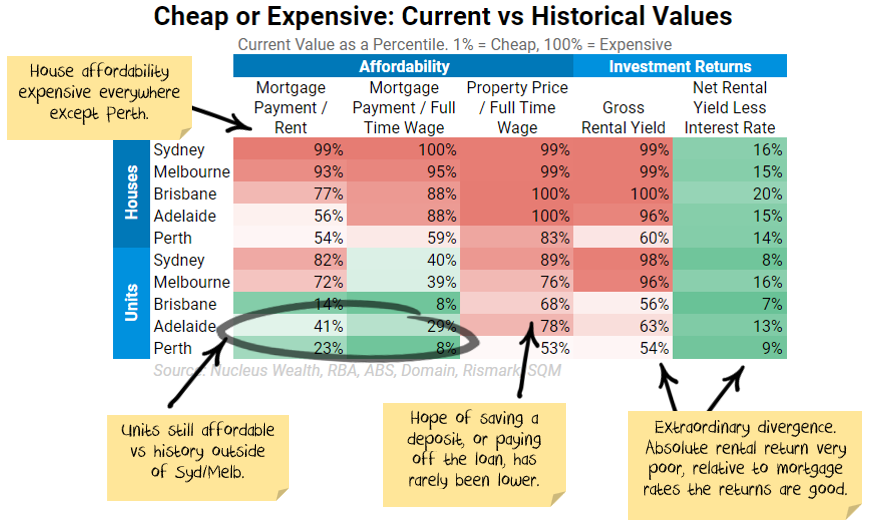
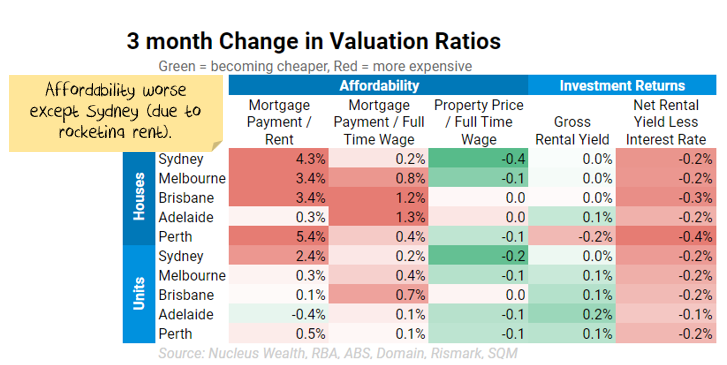
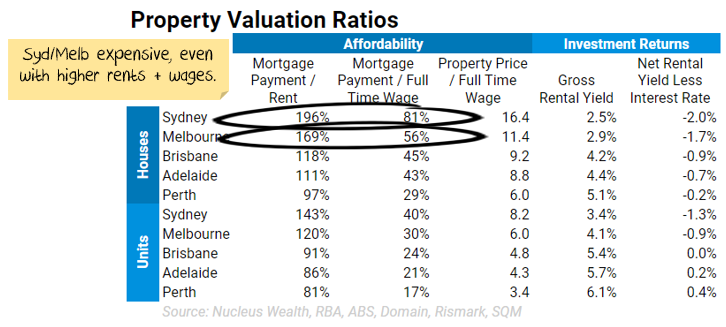
For the details charts for the above locations see the property detail update. For more on how and why we use these ratios see our residential real estate forecasting methodology.
Australian mortgage rates are on the march.
There are effectively two different interest rates at the moment, the floating rate and the three-year fixed rate.
- The floating rate is determined mainly based on the Reserve Bank of Australia. It reduced the floating rate to 0.1% in March 2020, which reduced the standard variable rate from banks to around 4.5%. Discounted variable rates made it as low as 3.45% and have now risen to 3.7%.
- In March 2020, the Reserve Bank also introduced a facility where they lent directly to the banks at 0.1% for three years. This facility (and other market interventions) allowed banks to drop three-year fixed mortgages to around 2%. Its name is the Term Funding Facility. It ended in June last year, and now three-year mortgages are over 4%.
When you adjust the factors in our property market calculator, you find that with higher interest rates, you would have to put in never-seen-before valuation ratios for house prices not to fall.
Battle of the housing stimulus plans
Labor has a plan to help homeowners with a deposit that will be treated like equity, and can be eventually repaid. The Coalition wants to allow first home buyers to effectively borrow from their own superannuation to fund a housing deposit.
It is an admirable goal to have more homeowners. It is less admirable to encourage higher prices by giving tax or regulatory breaks. Both parties are effectively finding a way for new homeowners to increase house prices.
The Reserve Bank is currently raising interest rates to cut off inflation. The largest contributor to Q1 inflation? Housing.
Which brings us to the bigger issue. Affordability. Both parties want to help homeowners buy, neither is helping to lower the ongoing cost. And there is a reasonable argument that the Reserve Bank will have to raise rates more than if the policies weren’t in place.
Have a look at the chart for Sydney:
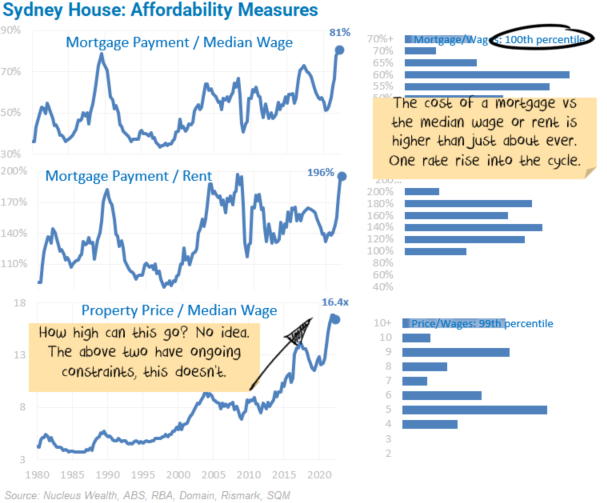
Which party has a better policy? I find it hard to love either. And there is far less between them than the parties try to make out.
Both policies are going to help with the deposit, but hinder the ongoing affordability. Which sounds like a short term gain for long term pain.
Do I have a problem with using super? Not really. Except that housing already has a raft of tax breaks, and superannuation is yet another tax break. And so, it will be doubling down even further on tax breaks for property.
Macro factors
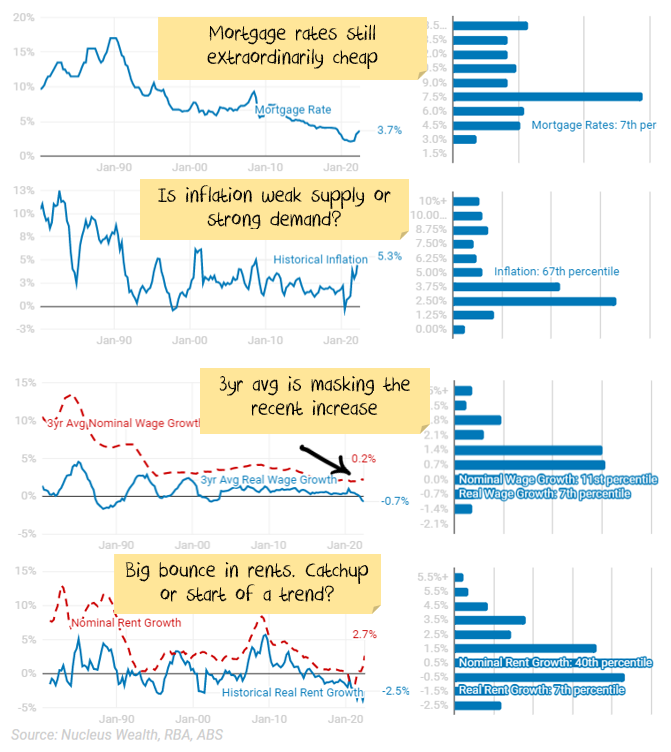
Australian Property Market Outlook
Property prices have been ripping higher in recent months. This has dented a number of affordability measures. Overall conditions are still quite good but are getting worse.
In my view, rising rates will trump the other factors, but there are many opposing forces at play.
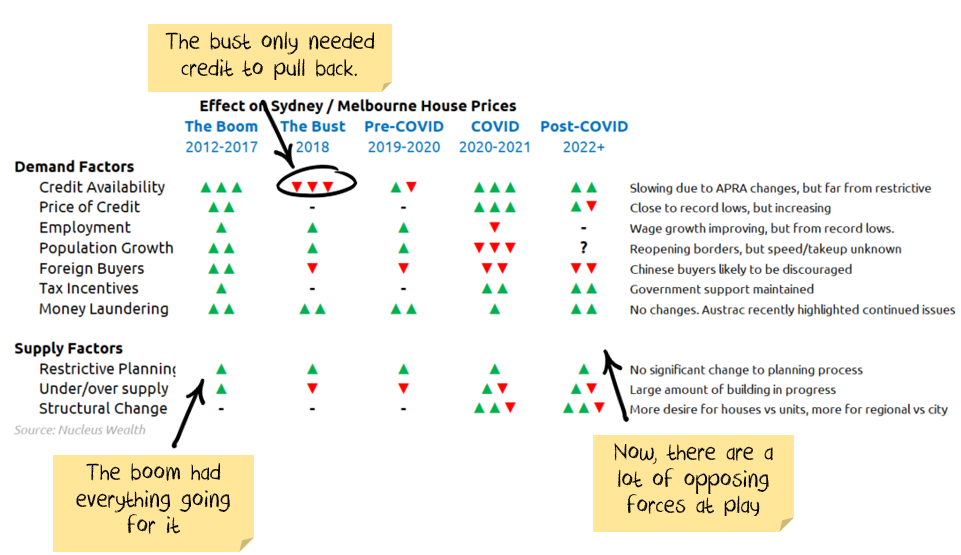
On the one hand, plummeting immigration, pandemic disruptions and the end of eviction/mortgage payment moratoriums aren’t helping. A boost in supply is in progress, spurred by new home building. Rental growth jumped again this quarter, but the last few years have been very weak. And Australia starts with a larger private debt burden than just about any other country.
On the other, we have a burning political desire to keep Australian property market prices high and pump more debt into the economy. Wage growth is low, meaning the interest rates rises that the market is pricing may not eventuate. There is a structurally higher demand for houses vs units due to the fear of more lockdowns. There is structurally higher demand for bigger houses, more rooms or fewer housemates given the move to work from home.
Australia is stuck in a debt trap. We’ve got so much debt we can’t raise rates because it makes it more difficult for people to pay back debt. To get more growth we have to cut rates, so people borrow more and the cycle goes on.
The most important issue right now is interest rates.
Sources:
Nucleus Wealth has compiled this data using a range of different sources.
We use Domain for more recent data quarterly property prices and rents, cross-checked with SQM to fill any short-term moves. Older information is from Rismark and the Australian Bureau of Statistics to fill time series.
For economic data, we use either Reserve Bank of Australia or Australia Bureau of Statistics data. For older data, we have had to estimate some factors due to differing definitions over time.

